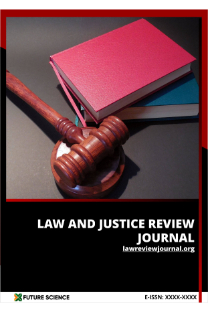Denetimli Serbestlik İşliyor mu? Türk Denetimli Serbestlik Sistemi Üzerine Bir Değerlendirme
Does the Probation Work? An Evaluation on Turkish Probation System
___
- Council of Europe Annual Penal Statistics, Space I-II, Survey 2015. Available at http://wp.unil.ch/space/2017/03/space-i-and-space-ii-2015/, 01.02.2017.
- Official numbers of prison population, probation decisions and crime cases in the public prosecutor’s offices between 2006 and 2016. Available at: http:// istatistikler.uyap.gov.tr/, 01.02.2017.
- Official numbers of probation decisions by years from 2006 to 2015. Available at: Ministry of Justice of Turkey, http://www.cte-ds.adalet.gov.tr/, 01.02.2017.
- Yazici AB, Yazici E, Akkisi Kumsar N, Erol A (2015) Addiction profile in probation practices in Turkey: 5-year data analysis, Neuropsychiatric Disease and Treatment 2015(11), p. 2259–2263.
- Yavuz HA (2011) Ceza Adalet Sisteminde Denetimli Serbestlik (Probation in Criminal Justice System), Doctoral Dissertation, Ankara: Gazi University.
- Yavuz HA (2016) Türkiye’de Denetimli Serbestlik Mümkün müdür? Dünü, Bugünü ve Yarınıyla Türk Ceza Adalet Sisteminde Denetimli Serbestlik (Is Probation Possible in Turkey? The Past, Today and Future of Probation in Turkish Criminal Justice System). In: International 10th Anniversary Symposium of Turkish Probation Proceedings, International Approaches, 8-10 December 2015 İstanbul, Symposium Book (2016), p. 15-23. Ankara: Ministry of Justice Pub., p. 15-23.
- Whitehead P and Statham R (2006) The History of Probation (Politics, Power and Cultural Change 1876-2005), Glasgow: Sweet and Maxwell Pub.
- Topçuoğlu T (2015) Türkiye’de Suçluluğa ve İnfaz Politikalarına İlişkin Veri İhtiyacı, TESEV Demokratikleşme Programı Raporu, İstanbul.
- Roberts JV, Stalans LJ, Indermaur D and Hough M (2003) Penal Populism and Public Opinion: Lessons From Five Countries, New York: Oxford University Press.
- Probation Rules, Recommendation CM/Rec (2010)1 of the Committee of Ministers to member states on the Council of Europe Probation Rules. Available at: http://www.cep-probation.org/wp- content/uploads/2015/03/ CMRec20101E.pdf.
- Raynor P (2012) Is Probation Still Possible? The Howard Journal 51(2), p. 173- 189.
- Othmani A (2008) Beyond Prison, The Fight to Reform Prison Systems around the World, Translated from the French by Marguerite Garling, New York: Berghahn Books.
- Lipton DS (1998) The effectiveness of correctional treatment revisited thirty years later: Preliminary metaanalytic findings from the CDA TE study. Paper presented at the 12th International Congress on Criminology, Seoul, S. Korea.
- Kury H, Ferdinand TN, Doob AN and Sprott J (2003) Does Severe Punishment Mean Less Criminality? International Criminal Justice Review, 13, p. 110-148.
- Kamer VK (2016) Türkiye’de Denetimli Serbestlik Sisteminin Kuruluşu ve Gelişimi (The Establishment and Development of the Probation System in Turkey). In: International 10th Anniversary Symposium of Turkish Probation Proceedings, International Approaches, 8-10 December 2015 İstanbul, Symposium Book (2016), Ankara: Ministry of Justice Pub., p. 24-26.
- Kalmthout AM and Tigges L (2008) Netherlands, Probation in Europe 2008, Confederation of European Probation. Available at: http://www.cepprobation. org/uploaded _files/Netherlands_The.pdf
- Dizman HI (2016) Denetimli Serbestlik Tedbiri Altındaki Hükümlülerde Yeniden Suç İşleme Oranlar, Bu Oranlarının Ölçülmesi ve Uluslararası Uygulamalara Dair Değerlendirme (Re-Offending Rates and Evaluation of International Applications with respect to the Method for Determination of These Rates Under Probation), In: International 10th Anniversary Symposium of Turkish Probation Proceedings, International Approaches, 8-10 December 2015 İstanbul, Symposium Book (2016), Ankara: Ministry of Justice Pub., p. 284- 295.
- Canton R and McFarlane MA (2014) Policy Transfer in Criminal Justice, Crossing Cultures, Breaking Barriers, London: Palgrave Macmillan UK.
- Burbank EG and Goldsborough EW (1954) The Probation Officer’s Personality: A Key Factor in Rehabilitation, Federal Probation, 18(2), p. 11-14.
- Barry K and McFarlane MA (2014) The Partnership between the United Kingdom in Developing Probation and Other Criminal Justice Services and Turkey’s Path to Accession. In: Canton R and McFarlane MA (2014) Policy Transfer in Criminal Justice, Crossing Cultures, Breaking Barriers (Editors) (2014) London, p. 15-36.
- Alptekin K, Mutlu E and Akın E (2016) Madde Bağımlılığı Tedavisi İçin Denetimli Serbestlik Şubeleri Tarafından Amatem’e Gönderilen Kişilere Yönelik Uygulamalarda Karşılaşılan Sorunlar (Problems with the Practies for People Sent to Amatem by Probation Directorates for Substance Abuse Treatment). In: International 10th Anniversary Symposium of Turkish Probation Proceedings, International Approaches, 8-10 December 2015 İstanbul, Symposium Book (2016), Ankara: Ministry of Justice Pub., p. 93-97.
- ISSN: 1309-9485
- Yayın Aralığı: 2
- Başlangıç: 2010
- Yayıncı: Türkiye Adalet Akademisi
Does the Probation Work? An Evaluation on Turkish Probation System
GLOBAL LEGAL PLURALISM: A NEW CHALLENGE TO INTERNATIONAL LAW?
THE CRITIQUE OF ISRAEL SUPREME COURT DECISIONS ON OCCUPATION UNDER THE INTERNATIONAL LAW
Saldırgan Devralma Tekliflerine Karşı Yönetim Kurulunun Takdir Yetkisi: Türk Hukuku İçin Öneriler
ORGANIZATIONAL STRUCTURE AND FUNCTIONS OF THE JUSTICE ACADEMY OF TURKEY
Sular İçin Hayati Koruma: Birleşik Devletler Temiz Su Yasası Vatandaş Davaları Hükmü
Türkiye Adalet Akademisi’nin Kurumsal Yapısı ve Görevleri
Küresel Kalkınma ve Adalet İlişkisinin Eleştirel Değerlendirmesi
Denetimli Serbestlik İşliyor mu? Türk Denetimli Serbestlik Sistemi Üzerine Bir Değerlendirme
